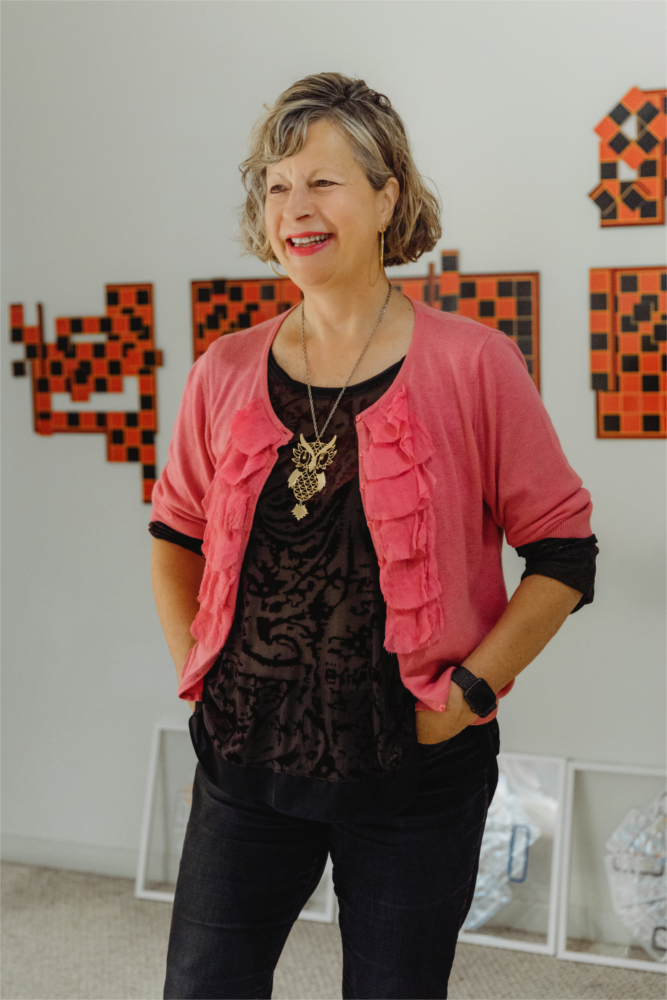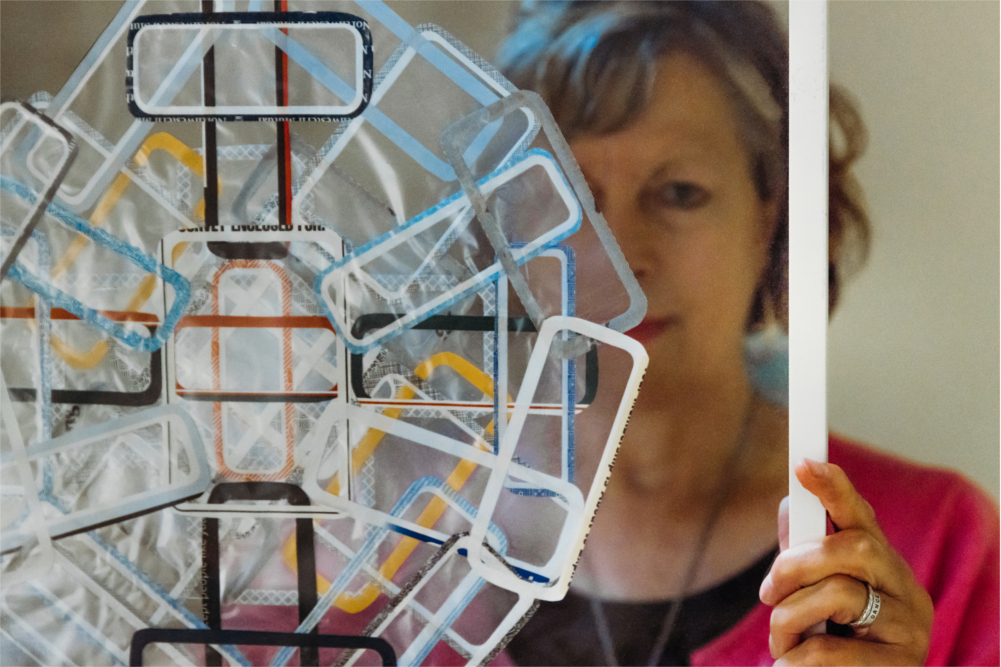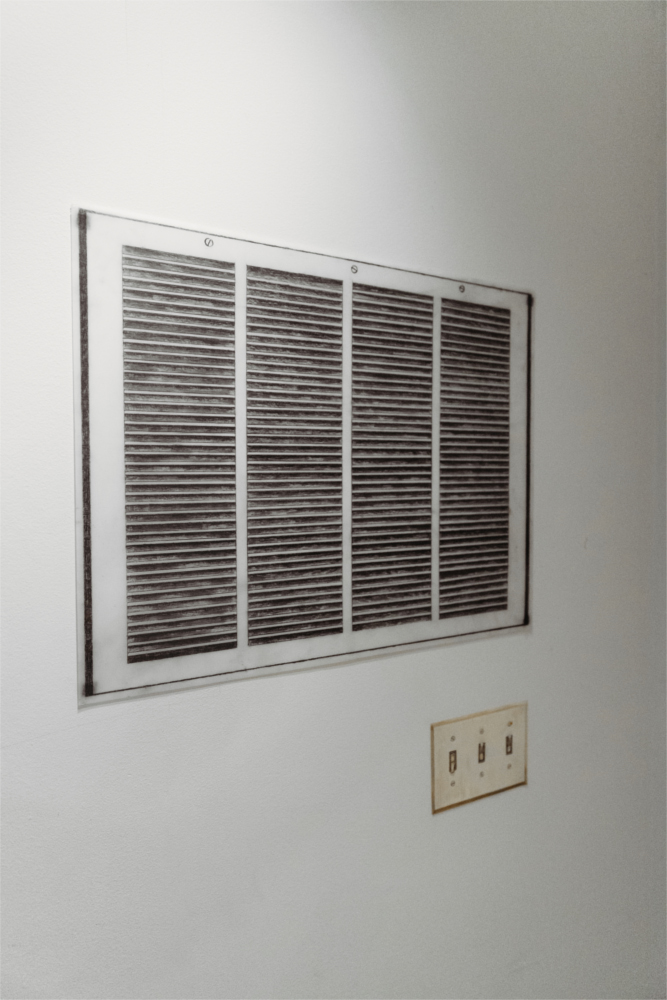Editor’s note: This story was inadvertently missing some copy in the print edition. This is the story in its entirety.
Jenny Roberts is an artist, poet and Chicago transplant living in West Michigan, whose work examines the subtleties of life. Paintings of stairwells and light switches, collages of reimagined checker boards and shadows of signposts and plants painted on sidewalks are just a few of the ways Roberts studies everyday objects. While she didn’t explore visual art until later in life, Roberts is not a first-time creator.
“It’s kind of unusual because I never identified as an artist until I was pretty old,” Roberts said. “I was really more of a writer, a poet. But I’ve always written poems and I always loved art, too. I made art for a while and then decided it would be more engaging and it would make me take it more seriously if I went to school, so I applied and got into the University of Chicago’s MFA program.
“They happened to be open to people who did not have a B.A. in art making before that, so they were more interdisciplinary. It was really intense and fun and engaging and scary, but I loved it, and since then, I’ve been making art pretty continuously.”
Simple things that are easily overlooked and routine experiences are what Roberts is most interested in capturing in her work.
“I feel a need for awareness myself of this banality that takes over, and I want to look at it anew,” she said. “I just want to reconfigure these small things that we don’t pay attention to and let them speak in a different way. That really intrigues me, and most of what I do has a route in that.”
First, she starts with an idea, pulling something from the world around her and imagining how it could come to life.
“I try to find something that will help me realize the idea as well as I can,” Roberts said. “I like painting with oil paint, but I’m not good at it. I try to make it work so that I can convey the imagery or the idea I have,” she continued. “It’s always an interesting process because I think of myself as a conceptual artist, which means, I suppose, the idea is first. But every time I make something, it changes in the process.”
Though capturing the subject matter the way she imagines it is part of her process, what’s most important to her is enjoying the work she’s doing.
“When I’m making something that amuses me, and I get a lot of energy from the urge to share that amusement, that is enlivening,” Roberts said. “Making it makes me feel happy, and it’s the highest form of a thought and feeling for me. Sharing it, the potential to share it, makes me happy.”
Back when she lived in Chicago, Roberts thrived on the urban environment, using the public spaces around her as her canvas. She chased the sun as she painted shadows and hastily put up signs she’d made on the walls of the train.
“When I was in Chicago for years, I did a lot of projects that were in public spaces, but not through an institution,” she said. “I would do sidewalk pieces and just let people find it or not. I did a black hole project where I just painted black holes throughout the city. One thing that was always important to me in doing those kinds of things was, I wanted it to be a guerilla action.
“It was never sponsored by an institution. Maybe I was afraid of meeting the expectations of an institution, but also, it felt freer. It felt more philosophically, politically authentic to me.
Since her move to Grand Haven, Roberts has been taking a different approach, focusing mostly on her studio work and revisiting her poetry.
“When I started making art, I didn’t write for a long time, but last year I wrote a book and it’s all joke poems,” she said. “The earlier book I did was odes to everyday things. I go to poems still, I go to poetry, and I’m never sure where it’s going to come from or when it’s going to happen, but art and poetry are both there for me somehow in the background.”
Poetry has played a pivotal role in Roberts’ experience, giving her an avenue to connect in a way that feels meaningful for her.
“I’m a very shy person,” she said. “My way of connecting with the world has sometimes been very solitary, so I think that I’m interested in where communication fails. In my poetry, I think about the experiences that are almost incoherent. I’m just really intrigued with that space and translating experience, transforming it.”
Every artist has their raison d’être, and Roberts is no different. She sees art as a fundamental part of the human experience.
“Art provides a space for the imagination to exist,” she said. “Art is essential to human life. It creates an intensity and a space that we all need, which can transform you in a small way — I’m not saying it’s going to go, ‘Whoa, my world has changed’ — sometimes that happens, but it’s rare.
“Just opening up to that possibility, it’s almost a political act. I’ve always had the intuition that all art is political, but maybe in a broader or a more complex way than through speaking about ideas because it contains more.”
Roberts describes herself as not being “good” at certain aspects of art, but nevertheless, she enjoys creating. To her, the richness of life is lost when we limit ourselves and our experiences.
“That’s actually something really profound about American culture in general is how obsessed we are with, ‘You have to be good at something or you can’t do it,’” she said. “Like, ‘I can’t sing because I don’t have a good voice.’ You narrow down your life so much. Resisting that is scary. You risk failing, but I think it’s better that way.”
This story can be found in the May/June 2022 issue of Grand Rapids Magazine. To get more stories like this delivered to your mailbox, subscribe here.












Facebook Comments